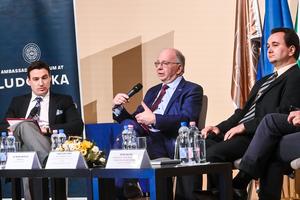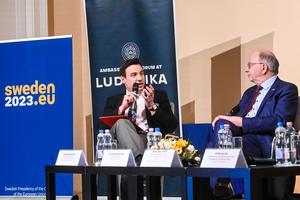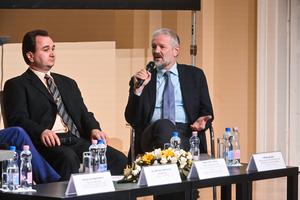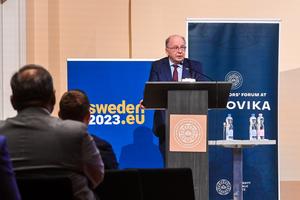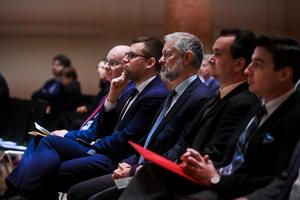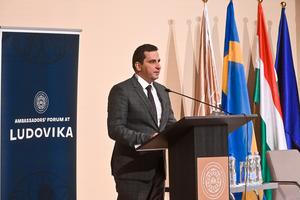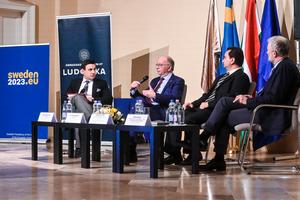On 28 February, the University of Public Service hosted its prestigious regular event, the Ludovika Ambassadors' Forum again. This first event of the semester always features the Ambassador of the country holding the rotating EU Presidency. This time H.E. Dag Hartelius, Ambassador of Sweden was the special guest.
The event was opened by Rector Gergely Deli. The main message of his welcome speech was that the past two years saw an unexpected upheaval in the world order: epidemics, economic recession, a bloody war in the neighbourhood, and the earthquake that struck Turkey and Syria. In these turbulent times, there is a greater need than ever for dialogue, cooperation and support between countries. He added that it is our honour to provide a platform for discussions.
H.E. Dag Hartelius delivered the keynote speech entitled "Comprehensive European Security - a Perspective of the North", in which he pointed out, among other things, that the Arctic and Baltic Sea regions are located on the strategic highway between Russia and the United States. In this area, Russian behaviour has become more assertive and even aggressive over the last decade. He recalled, for example, Russia's cyber-attack on Estonia in 2007, the attack on Georgia in 2008, the annexation of Crimea in 2014, and also the brutal attack on Ukraine a year ago. On the one hand, this development triggered Finland and Sweden to abandon their policy of military non-alignment. On the other hand, the accession of the two Nordic countries to the Alliance will be the final step in making the whole Baltic Sea region into one intrinsic part of Trans-Atlantic security and thereby strengthening NATO both in the north and as a whole. The ambassador then looked at the region south of Europe, the Sahel, and gave examples of how Europeans are cooperating in mitigating the threat stemming from this and other southern regions. In addition to the increased number of threat directions, there is also an increased complexity of the threats to European and Trans-Atlantic security, not least on the hybrid side – cyber operations and disinformation by state actors. This development calls for increased cooperation in the Trans-Atlantic community and also to build even more mutual trust when security is at the heart of the matter.
Following Ambassador Hartelius’ opening remarks, a round table discussion was held, which included Tamás Csiki Varga, Senior Research Fellow at the Strategic Defence Research Institute of the Eötvös József Research Centre, and Péter Siklósi, former Deputy State Secretary for Defence Policy and Planning. The discussion was moderated by Balázs Mártonffy, Head of the Institute of American Studies at the University of Public Service. The first question addressed to the experts inevitably focused on the chances of the Hungarian ratification of Swedish and Finnish NATO accession. According to Péter Siklósi, in a parliamentary democracy, MPs have the right to have concerns on a matter which they wish to examine in detail before voting, but he believes that the Hungarian Parliament will vote in favour of the two countries’ accession to NATO. The most important issue of the discussion could be the outcome of the Russia-Ukraine war. According to Tamás Csiki Varga, even fiercer fighting is expected in the upcoming months, and the more pessimistic forecasts suggest that peace may not even be reached by autumn. Mr Siklósi added that although Russia was believed to have the second-strongest armada in the world, it is clear now that this is not the case and the war is likely to end with the mutual exhaustion of the forces. In the discussion, it was also recognised that while the current war has triggered increased spending on traditional military security the complexity of the overall security threat makes a strong case also for stronger efforts to meet hybrid threats and here as well as to strengthen civil defence. In all these fields the EU has an important role to play. In response to Mr Mártonffy’s question pertaining to how Sweden reconciles its long-standing support of nuclear disarmament with its desire to join a nuclear weapons alliance, Ambassador Hartelius said that Sweden, after accession, will continue to work for nuclear disarmament like many other NATO members.
Experts also addressed the question that is of greatest concern to all: whether a nuclear escalation of war is likely. Siklósi Péter said that “what physically can be done, it is a possibility”, so if Russia feels existentially threatened, nuclear weapons could be used. Tamás Csiki Varga noted that in this war it is not Russia that is existentially threatened, but Ukraine. Closing, he noted that just because a nuclear state is "losing" a war does not mean that it will automatically go nuclear.
Text: International Office
Photos: Dénes Szilágyi
